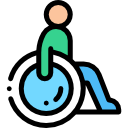We are a registered NDIS disability service provider specialising in providing exceptional care to clients across Sydney, Melbourne, Adelaide and Canberra. We are committed to empowering each of our clients to live as independently as they choose and work diligently behind the scenes to ensure our clients receive exceptional customer-focused service.
NDIS is an initiative by the Australian government to provide support to Australians experiencing disability, their families and carers.
This initiative provides Australians under the age of 65 who experience permanent and significant disabilities with the reasonable and necessary support they require and to assist them in their daily lives, including community involvement, education, employment, health and wellbeing.
The NDIS takes a lifetime approach, investing in people with disability early, to improve their outcomes later in life.
There are a number of factors which determine whether you or your loved one is eligible for support under the NDIS. You must meet the below requirements to be eligible for NDIS.


You or your loved one must be between 7 – 65 years of age.


You must live in Australia and be: An Australian citizen; A permanent resident; or A New Zealand citizen who is a Protected Special Category Visa holder.


You or your loved one must have a permanent or significant disability which substantially affects your ability to participate in activities without assistance and support from others or technology.
Applying is simple, see below our step-by-step guide or alternatively find out more information on how to apply via the NDIS website at www.ndis.gov.au/applying-access-ndis.
Check to see if you are eligible. You can do this by visiting ndis.gov.au.
Contact NDIA on 1800 800 110 and provide them with your details and a brief overview about you or your loved ones disability
Start a planning document. This should outline:
Meet with your plan coordinator and express your needs and goals so that your coordinator has a sound idea of what your needs are.
It is important to review your plan and ensure it has the correct information and details.
Make sure you are happy with how your funds have been allocated.
If you are happy with the contents of the plan, then advise your service providers that you have received your plan and forward them a copy, if able to.
As part of your NDIS journey you will need to make sure your service providers are paid on time, as well as, keep track of your funding.
You have the option of being self-managed, plan managed or NDIA managed.
Choose a service provider that best suits you and your needs. This is where we come in. We offer an array of services to help you and your individual needs. For more information on our services click here.
We believe in transparency. We have a client portal that allows you to keep track of your supports, services and your funding.
The NDIS will provide funding for core supports for everyday living, Capacity Building supports to improve skills and independence, and Capital to improve access and independence.
You may use your core support funding for: Assistance with Daily Life, Consumables, Assistance with Social and Community participation, Transport.
Capacity Building category
The Capital Supports budget has two support categories: Assistive technology, Home modifications